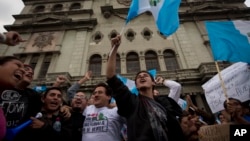Guatemala's Congress lifted President Otto Perez Molina's immunity of office Tuesday, opening him up to possible prosecution in a widening customs corruption scandal that has rocked his administration and the country's political system.
With 132 of 158 lawmakers approving the measure, prosecutors now can file criminal charges against Perez Molina just like any other citizen, and a judge can order his detention.
About 200 people outside the capitol cheered and set off firecrackers as news of the vote reached them, an echo of earlier massive street protests calling for his removal from office.
“Excellent! It is a step forward for Guatemala,” said Gerardo Corzo, a 71-year-old retiree.
Perez Molina, 64, has said he is innocent of corruption and has vowed to face the legal process against him.
“The president is aware of the new scenario, which was not the most desirable but was very probable,” his spokesman, Jorge Ortega, told The Associated Press. “He has said he will be very respectful and submit himself to the rule of law.”
Those voting against Perez Molina included members of his own ruling party.
“The party gave us permission to vote and withdraw the president's immunity,” lawmaker Luis Fernandez Chenal said. “He who owes nothing, fears nothing.”
The customs scandal already has claimed the job of Perez Molina's former Vice President Roxana Baldetti, who is in jail awaiting trial on accusations that she accepted millions in bribes in return for letting others avoid paying import duties. A number of Cabinet officials also have left office.
Protesters are demanding not only that Perez Molina step down but that Sunday's presidential elections be postponed. He has refused to do so.
Earlier in the day, civilians formed a wall of bodies to let lawmakers into Congress, protecting them from dozens of presidential loyalists who had blocked access to the building since the morning in a bid to delay the proceedings.
Interior Department Vice Minister Elmer Sosa had arrived with riot police to “guarantee the safety of protesters and Congress,” and lawmakers were finally able to go inside and begin the session.
“It was impressive that the people themselves came and created a human chain and a path so we could enter,” said opposition legislator Leonel Lira.
Government agents have had to step in on several occasions to keep backers and critics of the president away from each other.
In the wake of the fraud scandal, major government offices and businesses, the power base in Guatemala, have urged him to reconsider his resolve to stay, including the government comptrollers' office. Even Guatemala's national Council of Bishops issued a statement urging him to resign.
“This decision demonstrates that the people and their collective actions can get results, but this is just the beginning,” said activist Byron Garon. “Now we want him and his vice president to be tried and convicted, and for them to give back to Guatemala all that they stole.”





